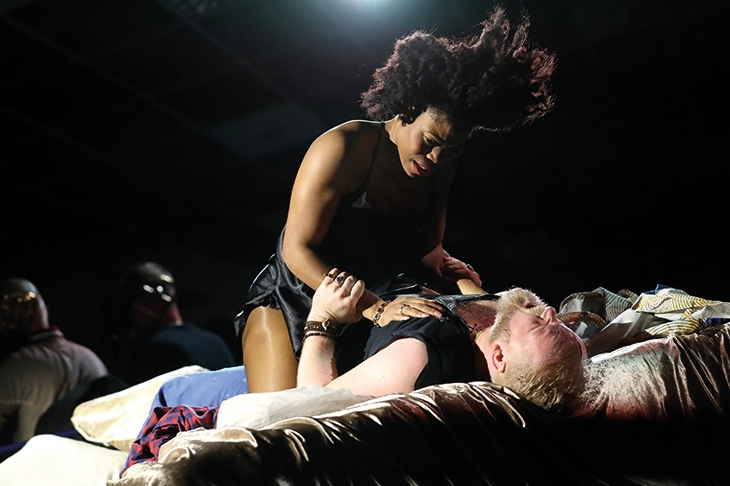You can see Graham Vick’s work at La Scala or the New York Met. But if you want to be directed by him, you need to go to Birmingham. The Tower Ballroom is a sticky-floored former nightspot out by Edgbaston Reservoir, artfully trashed by Block9, the people behind Banksy’s Dismaland. You crunch across the tarmac, pass the humanoid rats and the drug dealer with his prostitute cards (‘Sonyetka: Exotic Dancing – Russian Lessons’) and enter the crowd. Suddenly Vick’s on you: barking under his breath that you need to move and, should you fail to comply, shoving you firmly out of the way. Seconds later, a double bed careens through, or the space fills with knife-wielding brides in blood-smeared dresses.
It’s old news that Vick’s Birmingham Opera Company does things differently. True, Vick has acquired mannerisms, and they were all on display in Lady Macbeth of Mtsensk. In Vick-world policemen are always thugs, extras stumble about like zombies, and the politics are positively quaint (a sacred icon had the face of Mrs Thatcher). What’s astonishing, after 20 years of site-specific community-based work, is how fresh it still feels, delivering a thrill that goes far beyond the schoolboy delight of hearing Eric Greene (as Izmailov senior) bawling ‘Cocksucker!’ in a ringing baritone.
Perhaps that’s the benefit of throwing the company’s entire resources at a single, all-or-nothing show each year; and of staking everything, every time, on Vick’s ability to motivate his community performers and professional cast. Their commitment is what creates that unsettling BOC atmosphere, and gives the choral singing such a raw, almost frightening physicality. You’re sucked under. The moment (replicated in most BOC productions, but always overwhelming) when the lights flash out, the orchestra explodes, and everyone around you starts singing, is surely the closest that a non-performer can get to being a living part of the music. Resistance is pointless, and physically impossible anyway.
One difference this time came with the venue itself: marginally smaller and warmer than BOC’s usual disused factories, it turned out to have a pretty decent acoustic. That meant that the quiet moments actually worked — never a given with these promenade productions — and we could hear just enough compassionate softness in Chrystal E. Williams’s steely, seductively phrased Katerina to make her into a character rather than a cartoon.
Brenden Gunnell, a turkey-cock in leopardprint smalls, scraped together a rough-cut likability as her lover Seryozha, and under Alpesh Chauhan, the City of Birmingham Symphony Orchestra swung between the circus-band screeches and oily pianissimos of Shostakovich’s score with the muscular grace of a Soviet gymnast. In other words, no allowances needed to be made. Every sterile, faddish debate in contemporary opera is confronted, answered and impatiently thrown aside. Singing in English? Obviously. Surtitles? Unnecessary. Diverse casting? Been doing it for years. New audiences? Look around you. Critics can bicker, but meanwhile BOC has a show to put on.
To move the following night to Scottish Opera’s new production of Janacek’s Katya Kabanova could easily have been a jolt. The parallels are almost too neat: two interwar composers, each with their own lonely Katya — one from Ostrovsky, one from Leskov. But where the young Shostakovich treats the tragedy with filthy, lip-smacking malice, the sexagenarian Janacek takes his heroine’s side and stands by her with breathless sincerity. Janacek never achieved his artistic goals with more force, and I feel slightly embarrassed to prefer Jenufa — a less perfect drama, but one that allows some humanity even to its most unsympathetic characters.
Stephen Lawless’s staging updates the action to an industrial town in 1970s Russia. Rusting girder bridges criss-cross evil-looking Volga mudflats, and as Katya (Laura Wilde) sinks further into the emotional mire, the slime stains her white dress. Meanwhile, Patricia Bardon’s Kabanicha locks on to her like a spider descending its web. She deploys her voice like a torturer, gurgling with hatred at the bottom, lacerating at the top. Wilde’s gentle, radiantly sung Katya was heartbreakingly vulnerable before the onslaught, caressing her phrases and (in Lawless’s interpretation) displaying signs of mental illness long before her third-act breakdown. As if Janacek hadn’t already stacked the cards.
Stuart Stratford conducted tenderly and found all sorts of telling details, like the way the horns, music’s eternal symbol of untamed eros, soar rapturously free for the young lovers Varvara and Vanya (Hanna Hipp and Trystan Llyr Griffiths, an engaging pair), but snarl with menace beneath poor Katya’s music. Janacek never meant this opera to be even-handed, but when a traditional staging is as poetic and thoughtful as this, the final effect is the same as Vick achieves in Birmingham: the unconditional surrender of anyone capable of being moved by the combination of music and drama. Either of these productions would serve as a complete vindication of opera’s claims on 21st-century culture.






Comments